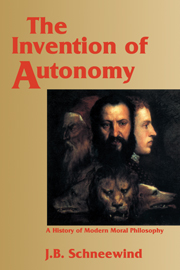Book contents
- Frontmatter
- Contents
- Preface
- Acknowledgments
- A note on references and abbreviations
- Introduction
- Part I The rise and fall of modern natural law
- 2 Natural law: From intellectualism to voluntarism
- 3 Setting religion aside: Republicanism and skepticism
- 4 Natural law restated: Suarez and Grotius
- 5 Grotianism at the limit: Hobbes
- 6 A morality of love: Cumberland
- 7 The central synthesis: Pufendorf
- 8 The collapse of modern natural law: Locke and Thomasius
- Part II Perfectionism and rationality
- Part III Toward a world on its own
- Part IV Autonomy and divine order
- Epilogue
- Bibliography
- Index of names
- Index of subjects
- Index of biblical citations
3 - Setting religion aside: Republicanism and skepticism
Published online by Cambridge University Press: 05 June 2012
- Frontmatter
- Contents
- Preface
- Acknowledgments
- A note on references and abbreviations
- Introduction
- Part I The rise and fall of modern natural law
- 2 Natural law: From intellectualism to voluntarism
- 3 Setting religion aside: Republicanism and skepticism
- 4 Natural law restated: Suarez and Grotius
- 5 Grotianism at the limit: Hobbes
- 6 A morality of love: Cumberland
- 7 The central synthesis: Pufendorf
- 8 The collapse of modern natural law: Locke and Thomasius
- Part II Perfectionism and rationality
- Part III Toward a world on its own
- Part IV Autonomy and divine order
- Epilogue
- Bibliography
- Index of names
- Index of subjects
- Index of biblical citations
Summary
In the fifteenth and sixteenth centuries an open avowal of atheism was very likely to get one burned at the stake. But it was not necessary to deny Christian teaching in order to explore how life might look if one more or less set it aside. In this chapter I present the work of three writers who engaged in this kind of venture. Neither Machiavelli nor Montaigne had any wish to write systematic philosophy; Charron tried, but it was the temerity of his conclusions rather than the power of his arguments that gave his main work its great popularity. Each investigated, in different ways, how people might be ruled or guided without calling upon any truths of Christianity. Machiavelli thought he could draw lessons about political self-rule from the history of pagan antiquity. Montaigne and Charron, skeptics both, were concerned about personal life as well as politics. They were led, consequently, to make the first modern efforts to articulate a morality of self-governance.
Virtú and the manipulative prince
No thinker of the sixteenth century more visibly shocked Christian sensibilities than Niccolo Machiavelli (1469–1527). His vehement rejection of Christian doctrine as a guide in matters of politics, and the strikingly immoral advice he deliberately offered to princes, made his first name into a synonym for the devil in Elizabethan England, and he is still remembered mainly for advising unscrupulous manipulation in politics.
Information
- Type
- Chapter
- Information
- The Invention of AutonomyA History of Modern Moral Philosophy, pp. 37 - 57Publisher: Cambridge University PressPrint publication year: 1997
